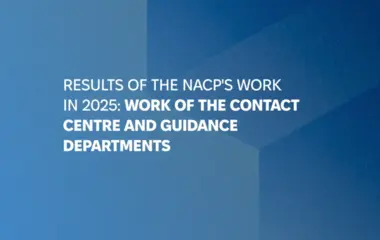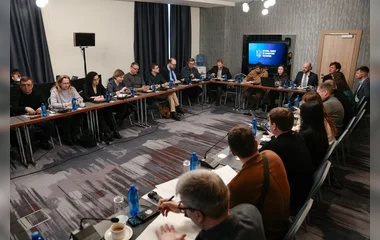Public procurement, customs, border crossing violations, and illegal deforestation are the most vulnerable areas to corruption in different regions, especially in Zakarpattia region, as the region borders on four countries.
This was stated by Viktor Pavlushchyk, Head of the National Agency on Corruption Prevention (NACP), during his visit to Zakarpattia. These and a number of other issues were discussed during a meeting with the leadership of the Uzhhorod City and Regional Councils, as well as the Regional Military Administration (RMA). Particular attention was paid to the effective implementation of the State Anti-Corruption Program for 2023-2025 at the local level, as well as to the issues of re-located business and construction.
According to NACP Head, the Agency has developed a number of effective anti-corruption tools, the implementation of which will minimize corruption risks and increase the level of integrity in local governments. In particular, the Agency has begun work on a strategic analysis of corruption risks in the customs sector and is collecting information to provide recommendations for their elimination. Therefore, NACP is interested in cooperating with the Zakarpattia authorities, civil society activists and business in this matter.
"Maximum inclusiveness and involvement of civil society, openness of data will not only engage residents in solving problems important to society, but also ensure transparency of decision-making at the local level and establish a dialogue with the authorities. This will significantly minimize corruption risks,” said Viktor Pavlushchyk.

NACP Head Viktor Pavlushchyk and Uzhhorod Mayor Bohdan Andriyiv signed the Declaration on Building Integrity in Local Self-Government. The City Council became the 40th organization to declare its intention to implement the principles of transparency and integrity in its activities. The Zakarpattia Regional Council signed the Declaration in August this year.
According to the Head of NACP, the involvement of the regions in signing the document is an important indicator of the local authorities' movement towards maximum transparency and implementation of integrity standards.
The participants of the meeting also discussed the issues of electronic declaration and financial control. NACP has launched 23 full audits of declarations of Zakarpattia officials, of which 12 have already been completed. As a result of the six completed audits, inaccurate information was found to have been entered for more than UAH 314 million and signs of unreasonable assets were found for UAH 2.6 million. Since 2022, 4 protocols on conflict of interest have been drawn up against public officials in Zakarpattia.
Myroslav Biletskyi, Acting Head of the Regional State Administration, noted that the regional authorities are interested in cooperating with NACP and establishing an effective dialogue, as it is mutually beneficial for both parties and will minimize corruption risks in the region.
Roman Sarai, Head of the Regional Council, noted that at the sessions of the Regional Council, the need for deputies to comply with the conflict of interest legislation is always emphasized. In addition, the introduction of integrity principles will help to strengthen competitiveness and attract investment.
In addition, during the regional trip, NACP Head met with representatives of law enforcement agencies to discuss cooperation on financial control, the procedure for interaction through anti-corruption commissioners, and the most corrupt areas of the region.
The NACP's regional visits project was launched to strengthen the NACP's cooperation with communities, local authorities, secondary and higher education institutions, journalists, and NGOs and to promote building integrity through community engagement. Representatives of the Agency have already visited Lviv, Dnipro, Chernivtsi, Zhytomyr, Ivano-Frankivsk, Vinnytsia, Lutsk, Cherkasy, Khmelnytskyi, Kharkiv and Odesa.
Direct dialogue with the regions is aimed at establishing constructive cooperation for the effective implementation of the state anti-corruption policy with a focus on local issues.











